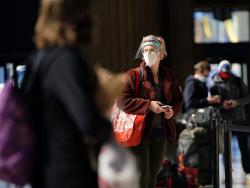
In Pennsylvania, if you’re having friends over to socialise, you’re supposed to wear a mask — and so are your friends.
That’s the rule, but Barb Chestnut has no intention of following it.
“No one is going to tell me what I can or not do in my own home,” said Chestnut, 60, of Shippensburg.
“They do not pay my bills and they are not going to tell me what to do.”
As governors and mayors grapple with an out-of-control pandemic, they are ratcheting up mask mandates and imposing restrictions on small indoor gatherings, which have been blamed for accelerating the spread of the coronavirus.
But while such measures carry the weight of law, they are, in practical terms, unenforceable, and officials are banking on voluntary compliance instead.
Good luck with that.
While many are undoubtedly heeding public health advice — downsising Thanksgiving plans, avoiding get-togethers, wearing masks when they’re around people who don’t live with them — it’s inevitable that a segment of the population will blow off new state and local restrictions and socialise anyway.
Experts say that could put greater stress on overburdened hospitals and lead to an even bigger spike in sickness and death over the holidays.
“When this started in early March, we weren’t staring at Thanksgiving and Christmas, and we didn’t have the disease reservoir that we have. And that, to me, is the biggest concern in the next few weeks,” said Dr David Rubin, the director of PolicyLab at Children’s Hospital of Philadelphia.
He called the risk of a Thanksgiving spike “extremely high.”
“I think you’re seeing a lot of resistance here,” Rubin said.
The nation is averaging 172,000 new virus cases per day, nearly doubling since the end of October, according to Johns Hopkins University.
Hospitalisations, deaths and the testing positivity rate are also up sharply as the nation approaches Thanksgiving.
In response, elected officials are imposing restrictions that, with some exceptions, fall short of the broad-based stay-at-home orders and business shutdowns seen in the spring.
Utah and Vermont have banned all social gatherings.
So have local governments in Philadelphia and Dane County, Wisconsin.
In Kentucky, no more than eight people from two households are permitted to get together; in Oregon, the gathering limit is six. California has imposed an overnight curfew.
More states are requiring masks, including those with GOP governors who have long resisted them.
The nation’s top health officials are pleading with Americans to avoid Thanksgiving travel.
Follow The Gleaner on Twitter and Instagram @JamaicaGleaner and on Facebook @GleanerJamaica. Send us a message on WhatsApp at 1-876-499-0169 or email us at [email protected] or [email protected].








